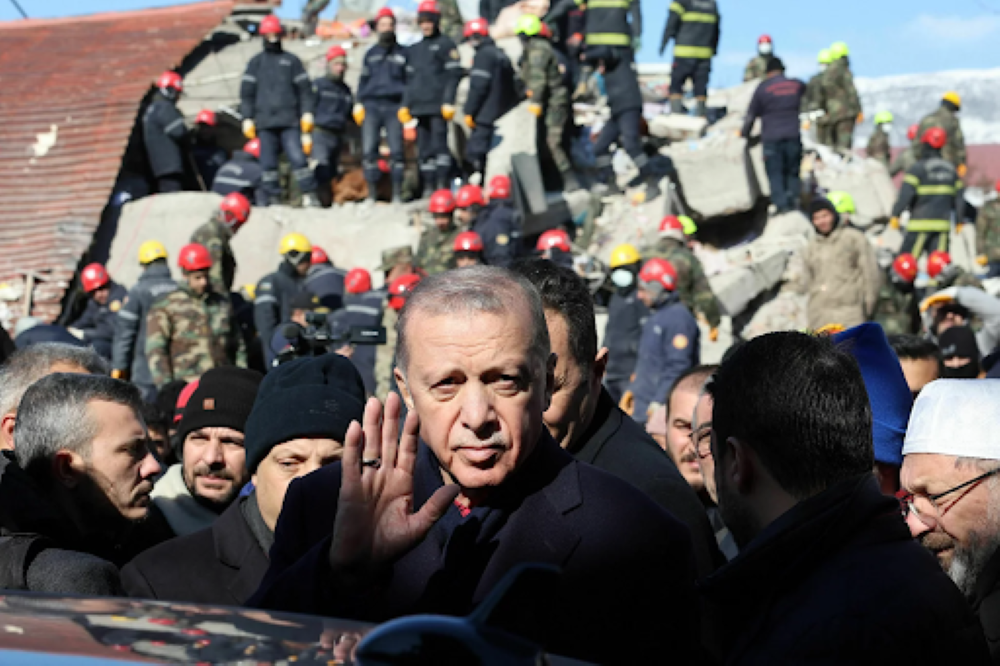
ESMA OZGUN – MARCH 14TH, 2023
EDITOR: GRIFFIN SHUFELDT
As Turkey suffers from the destruction of the deadliest earthquake in decades, President Recep Tayyip Erdoğan will have to contend with the exacerbation of preceding economic challenges. Prior to the quakes, the nation was grappling with a volatile, devalued currency and an inflation rate of a staggering 80% last October, fuelled by the relentless lowering of interest rates. Added to the equation is an estimated loss of $84 billion (around 10% of Turkey’s GDP) and a devastated population. Amidst all the chaos, Erdoğan is making a bid for the upcoming elections in May.
At the epicenter of Turkey’s economic woes is institutional corrosion and democratic backsliding, which has enabled Erdoğan to brazenly slash interest rates despite raging inflation. Beginning with the violent crackdown in 2013 on the Gezi Park protests, Erdoğan has emerged as a political strongman, consolidating greater power via a constitutional amendment that shifted the parliamentary system to a presidential one. He controls the nation’s monetary policy through his reign over the central bank, which has succumbed to political pressure despite remaining nominally independent. Over the last two years alone, three governors were forced to resign after refusing to comply with the President’s unusual demands.
All of this has enabled Erdoğan to implement what is dubbed “Erdoğanomics,” the President’s heterodox alternative to neoclassical economics, which maintains that higher interest rates actually increase inflation and not vice versa. Erdoğan has consistently lowered rates in response to raging inflation, persisting with a recent reduction by 50 basis points despite the earthquakes. In addition to bewildering economists, Erdoğanomics also presents a confounding puzzle for political scientists — as presidential elections draw nearer, why does the President persist in lowering rates despite the political repercussions? Indeed, a study conducted in Turkey last year concluded that inflation and currency crises reduce voter preference for the incumbent by 7 percent, while a currency devaluation of 6.6% lowers approval ratings by 1.6%.
Most media in the West dismiss Erdoğan as lacking rationality or being deluded by religious zeal, given that usury is prohibited in Islam (the primary religious affiliation in Turkey) and is condemned by Erdoğan as “the mother of all evil.” However, ignoring other possible motives prevents insights into Turkey’s economic affairs and investigations as to why developing nations sometimes pursue seemingly self-destructive policies.
One theory is that Erdoğan wishes to pursue a manufacturing-based, export-led economy modeled on Asia, as he has cited the example of China’s growth trajectory on several occasions. Currency undervaluation, when done carefully, can abet growth among developing nations by boosting the international competitiveness of domestic firms due to the cheapening of exports vis-à-vis other countries. Depreciation also reduces labor costs, which attracts greater international investments and thus increases growth. Is the depreciation of the lira, which is a consequence of low interest, part of a long-term plan to cultivate a production hub? Does President Erdoğan perceive the economic and electoral costs of his policies as a short-term necessity?
Publicly he may be marketing it as such, but Erdoğan is conversely making maneuvers to keep the lira afloat. In 2021, he announced a “lira-ization” scheme, ensuring investors against currency losses in Turkish Lira deposits, thus depressing demand for the dollar. He has burned through hundreds of billions of dollar reserves to slow domestic depreciation, and subsequently has resorted to political acrobatics to attract dollar deposits from abroad. Vitriolic condemnations of “enemies” and “terrorists” were reversed as ties were normalized with Israel, the UAE, and Saudi Arabia, the latter of which deposited 5 billion dollars after the murder of journalist Jamal Khashoggi was swept under the carpet.
Incidentally, the liraization policy reveals how Erdoğan isn’t as pious as the West may claim. By guaranteeing returns on lira investments and exempting the gains from taxes, Erdoğan has generously incentivized individuals to profit off of interest — thus tempting those that may have otherwise stored dollars under their mattresses. In essence, he has indirectly raised the interest rate indexed to the dollar, signifying deeper dynamics at play than simply the hollow religious justifications offered to the public.
The abundant currency interventions also disprove the desire to create an export-led model, revealing it as an excuse for the inability to curb depreciation. As Eray Şimşek at the Central European University argues, currency depreciation is viewed not as an opportunity, but as an undesired consequence of low-interest rates. Aside from religion, then, why are interest rates off the table? A possible explanation is the relationship between business and the state, the former of which has vested interests in Erdoğan’s monetary policy. The cultivation of business loyalty — specifically, the construction sector — aided the political ascent and consolidation of the Justice and Development Party (AKP). Construction firms bolster the AKP’s legitimacy by creating short-term growth and issuing cheap housing for their voter base, and in return benefit from low interest rates that provide them with cheap credit. This has in turn bred the dependency of the urban poor on the AKP, creating a resilient electoral coalition.
Erdoğan may have a reason to believe that low-interest rates will generate sustained growth. The initial boom of the construction sector stimulated various other economic sectors, created job opportunities, and facilitated the expansion of a thriving middle class, all of which contributed to the electoral success of the AKP since 2003. Within a wider context, Erdogan’s pursuit of growth at the expense of macroeconomic consequences is not an isolated motivation, but a part of the wider debate between the “developmentalists” and “stabilizers” in Turkey’s bureaucratic circles. While stabilizers argue for financial stability and predictable inflation, developmentalists favor vigorous stimulation for growth. It isn’t surprising that construction companies are the outspoken voices of the developmentalists. The quid-pro-quo between these firms and the AKP extends beyond a transaction of interest rates and voter support into a larger issue of state capture, where the sectoral interests of firms bleed into public policy. Positions on both sides are occupied by the same individuals, paving the way for corruption; among the ten companies that receive the most public tenders globally, Turkish construction companies constitute half of the list. The “Big Five,” as they are known, are offered capital procured from groups disloyal to the AKP and favored in the privatization of government-owned enterprises, in addition to siphoning public rent. As such, these firms are often ardent supporters of Erdoğanomics, offering another plausible rationale for Erdoğan’s insistence on low interest.
Construction and real estate may have yielded desired economic growth at the time. However, as the economist Daron Acemoğlu argues, robust institutions that are necessary for sustained innovation and development are lacking in Turkey, along with productivity growth which has been zero or less over the past decade. The political system, civil society, and educational institutions must be able to operate freely to attract investment and quality growth. Erdoğan’s increasingly autocratic rule, however, makes this unlikely.
Yet the President’s grasp on power is unstable. The scale of the present devastation partly lies in the aforementioned corruption; lucrative deals with construction firms led to the government’s negligence in enforcing building codes and diverted the focus from repairing low-grade apartments. As always, the lower classes have borne the brunt of these blunders, previously having shouldered the impact of Erdoğanomics. The middle class that Erdoğan had once helped cultivate is eroding, as food and transportation prices have doubled and youth unemployment has reached 25 percent; added to the distress, a population of 1.5 million people is now homeless following the earthquakes. All of this is an enormous blow to Erdoğan’s political prospects, who has resorted to doling out tax cuts, early retirement pensions, and energy subsidies ahead of the election.
If anything, the effects of the earthquakes exemplify the fundamental issues underlying Erdoğanomics. President Erdoğan’s reach has extended to relief agencies, where he has staffed positions with loyal executives and downgraded the Turkish Red Crescent Society in favor of the government-operated Disaster and Emergency Management Presidency (AFAD), over which he can exercise greater control. Both were ultimately unsuccessful in coordinating aid to victims, attesting to the institutional decay underlying flawed construction practices — in the exact same way it underlies Erdoğanomics. With the construction sector now under fire, it remains to be seen if present economic conditions will trigger the demise of Erdoğan. The people are disenchanted with his policies as it becomes clear that rather than waging a holy war against interest, he is lining the pockets of fellow loyalists. Indeed, the economic trajectory of Turkey has less to do with irrational, uninformed economic policy and more to do with power poisoning — offering us all a potent lesson on the significance of sound institutions and politics for ensuring economic stability.
Featured Image Source: NPR
Disclaimer: The views published in this journal are those of the individual authors or speakers and do not necessarily reflect the position or policy of Berkeley Economic Review staff, the Undergraduate Economics Association, the UC Berkeley Economics Department and faculty, or the University of California, Berkeley in general.



